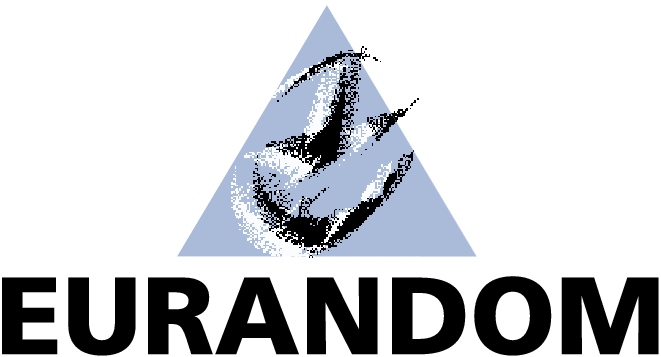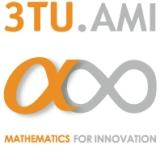

About | Research | Events | People | Reports | Alumni| Contact | Home

Academia meets Industry
November 29, 2012
| SUMMARY | SPONSORS | SPEAKERS | REGISTRATION |
Stochastic operations management
is concerned with decision taking under uncertainty. In real life, examples
abound of situations in which decisions must be made, costs must be minimized,
etc., while only partial information is available. One may think of revenue
management, inventory control, staffing of call centers, the organization of
warehouses, traffic management, and many other topics. In this day of lectures,
several applications of stochastic operations management will be discussed in
so-called duo lectures. Each of five duos (one from industry-at-large, one from
academia) will first present a real-life problem, and subsequently a possible
approach.
| Onno Boxma | TU Eindhoven |
| Ton Langendorff | 3TUAMI |
| Patty Koorn | Eurandom |
Pairs of speakers:
| Aafke Visser-van Boekel | Océ-Technologies B.V. | + | Geert-Jan van Houtum | TU Eindhoven |
| Bruno van Wijngaarden | Vanderlande Industries | + | Ivo Adan | TU Eindhoven |
| Alex Kuiper | IBIS researcher | + | Michel Mandjes | University of Amsterdam |
| Fred Boer | LUMC | + | Richard Boucherie | University of Twente |
| Tim Jonker | Municipality Eindhoven | + | Marko Boon | TU Eindhoven |
Please fill in the online registration form. There is no registration fee for this workshop.
| 09.30 - 09.45 | Opening | Kees Vuik (TU Delft) | |
| 09.45 - 10.45 | A. Visser - G-J v. Houtum | Spare Parts Planning: A New Concept for the Field Stock Planning at Océ Technologies | |
| 10.45 - 11.15 | Coffee/tea break | ||
| 11.15 - 12.15 | B.v. Wijngaarden - Adan | Models for warehouse design and control: simulation, analytic or both? | |
| 12.15 - 13.15 | Lunch | ||
| 13.15 - 14.15 | A.Kuiper - M.Mandjes | Optimized Appointment Scheduling | |
| 14.15 - 14.30 | Coffee/tea break | ||
| 14.30 - 15.30 | F. Boer - R. Boucherie | Operations Research in healthcare | |
| 15.30 - 15.45 | Coffee/tea break | ||
| 15.45 - 16.45 | T. Jonker - M. Boon | Optimization of garbage dumps | |
| 16.45 - | Closing | ||
Spare Parts Planning: A New Concept for the Field Stock Planning at Océ Technologies
Presentation by: Aafke Visser-van
Boekel and Geert-Jan van Houtum
Océ Technologies has service contracts with many of its customers for advanced
printing systems. These contract specify time limits within which failures of
systems have to be solved. For these services, availability of spare parts plays
an important role. Two years ago, Océ has started to implement a new concept for
the planning of the so-called spare parts field stock, which consists stock in
the cars of the service engineers and so-called Quick Response Stockpoints. This
concept is based on spare parts inventory models with lateral transshipments and
its development started with the master thesis study of Rijk (2007). In this
presentation, we show the basic idea of the concept, the results of a pilot, the
changes that had to be made to make the concept work in the practice of Océ, and
the first benefits that have been obtained by Océ.
PRESENTATION Visser - van Houtum
Models for warehouse design and control: simulation, analytic or both?
Presentation by: Bruno van Wijngaarden and Ivo Adan
In this talk we first focus on the use of simulation models for the design and control of warehouses. Simulation models can be used at different levels of aggregation, ranging from highly abstract to very detailed.Every level requires different tools: process algebra based models (without visualization) are used at the highest level of abstraction. Dynamic simulation tools, offering visualization, typically model more details. The next higher level of detail are emulators that model subsystems and their interfaces. The various levels of simulation will be illustrated by examples. But what is the role of analytic models? Is it possible to enhance this process of design by use of analytic models? This question will also be addressed.
Optimized Appointment
Scheduling
Presentation by: Alex Kuiper
and Michel Mandjes
In order to minimize the server’s
idle times in a service system and, simultaneously, the customers’ waiting
times, one may fix the arrival times of the customers beforehand in an
appointment schedule. We propose a procedure for determining appointment
schedules by sequentially minimizing the per-customer expected loss. Our
approach provides schedules for any convex loss function; for the practically
relevant cases of the quadratic and absolute value loss function appealing
closed-form results are derived. Importantly, our approach does not impose any
conditions on the service time distribution; it is even allowed that the
customers’
service times have different distributions.
A next question that we address concerns the order of the customers. We develop
a criterion that yields the optimal order in case the service time distributions
belong to a scale family, such as the exponential family. The customers should
be scheduled then in non-decreasing order of their scale parameter.
While the optimal schedule can be computed numerically under quite general
circumstances, in steady- state it can be computed in closed form for
exponentially distributed service times under the quadratic and absolute value
loss function. Our findings are illustrated by a number of numerical examples;
these also address how fast the transient schedule converges to the
corresponding steady-state schedule.
In the last part of the talk, we present practical considerations regarding
implementation in real-life scenarios.
These relate to the estimation of the service time distributions, explicit
computation for phase-type distributions, and numerical issues.
Operations Research in healthcare
Presentation by Fred Boer and Richard Boucherie
Healthcare is absorbing more and more of the national budget, which appears to be an impossible scenario for the future. This industry will have to provide more service and more quality against lower costs. At the front end of disease processes, there is much room for prevention of illnesses, since many diseases are the result of unhealthy lifestyles. However, the impact of prevention is slow and requires many years to show its efficacy. At the back end, the hospital needs to adopt to increasing demand by the emergence of baby boomers in the coming years. Hospitals develop programs to improve their efficiency, often aimed at improving existing planning and production (local optimization). Engineers and operations researchers can assist them in discovering underlying principles and solutions for example invoking successful methods from other industries. This presentation gives an overview of recently developed methods and tools and shows that Operations Research is finding its way in the hospitals to become an accepted discipline for boards and doctors aiding them in solving the business problems they are faced with.
Presentation by: Tim Jonker and Marko Boon
The municipality of Eindhoven currently has three sites where garbage can be disposed of. As a service to the inhabitants of Eindhoven, the garbage can be dumped free of charge. Unfortunately, several problems arise at the garbage dumps. Long waiting lines appear in front of the gates, especially during weekends and holidays. These queues cause dangerous traffic situations, but they are also a major source of customer dissatisfaction. Although this customer dissatisfaction by itself is a good reason to improve the performance of the garbage dumps, another reason is that dissatisfaction easily leads to undesired customer behaviour:blocking inside the dump, and worse garbage type separation.
In this joint project of Gemeente Eindhoven and Eindhoven University of Technology, we study the current layouts of the three garbage dumps and develop a mathematical model to predict the queueing behaviour inside and outside the dumps. In this talk we will discuss the practical aspects of garbage disposal, and the mathematical model. We use a custom-made simulation tool to analyse several scenarios that could improve the situation at the various dumps, and ultimately lead to more customer satisfaction.
PRACTICAL INFORMATION
Conference Location
The workshop location is Eurandom, Den Dolech 2, 5612 AZ Eindhoven, METAFORUM
Building, 4th floor, room MF 12.
Eurandom is located on the campus of Eindhoven University of Technology in the Laplace Building (marked "44" on this map). The building is located at 15 minutes walking distance from the central railway station of Eindhoven. Take the northern exit from the station and walk in the north-eastern direction until you reach a crossing at Professor Doctor Dorgelolaan. The university campus is located on the other side of that street. Detailed directions via Google Maps are available here.
For travel information to Eindhoven please check http://www.eurandom.tue.nl/contact.htm
CONTACT
For more information please contact
Mrs. Patty Koorn,
Coordinator Eurandom
This lecture day is sponsored by:
.jpg)

.jpg)